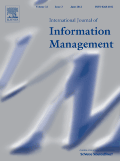
INTERNATIONAL JOURNAL OF INFORMATION MANAGEMENT
Scope & Guideline
Elevating research standards in artificial intelligence and communications.
Introduction
Aims and Scopes
- Information Technology Adoption and Use:
Research exploring frameworks and models that explain how individuals and organizations adopt and utilize information technologies, including the Unified Theory of Acceptance and Use of Technology. - Digital Transformation:
Studies examining how organizations leverage digital technologies to transform their operations, business models, and customer interactions, particularly in response to crises like COVID-19. - Artificial Intelligence and Machine Learning Applications:
Investigating the implications of AI and machine learning on various sectors, including healthcare, marketing, and e-commerce, focusing on both technical and ethical considerations. - Social Media and Information Management:
Analysis of the role of social media in information dissemination, engagement, and its impact on consumer behavior and organizational practices. - Sustainability and Information Systems:
Research focused on how information systems can support sustainability initiatives, including the adoption of green technologies and practices in organizations. - Blockchain Technologies:
Exploring the applications and implications of blockchain technology in various domains, including supply chain management and data privacy. - User Experience and Human-Computer Interaction:
Studies on the design and effectiveness of user interfaces and experiences in technology adoption, particularly in e-commerce and service recovery contexts. - Crisis Management and Resilience:
Research on the role of information systems in managing crises and enhancing organizational resilience, particularly during unforeseen events.
Trending and Emerging
- AI Ethics and Governance:
Growing interest in the ethical implications of AI technologies, including bias in algorithms and the governance of AI applications, is becoming a significant area of focus. - Generative AI and Content Creation:
The rise of generative AI tools and their applications in marketing, creative industries, and content generation is a rapidly expanding research theme. - User-Centric Design in Technology Development:
An increasing emphasis on user experience and human-centered design principles in the development of information systems and technologies. - Digital Sustainability Initiatives:
Research exploring how digital technologies can contribute to sustainability goals, including reducing carbon footprints and promoting sustainable practices in organizations. - Crisis Communication and Information Management:
Emerging studies on the role of information management and technology in crisis situations, particularly regarding stakeholder engagement and communication strategies. - Blockchain for Transparency and Trust:
Growing exploration of blockchain technology as a means to enhance transparency and trust in various sectors, including supply chain management and public services. - Social Media Analytics and Consumer Insights:
Increasing focus on using social media data to gain insights into consumer behavior and engagement, particularly during and after crises. - Data Privacy and Protection:
Emerging research on the implications of data privacy regulations and practices in the context of information management and technology adoption.
Declining or Waning
- Traditional IT Management Practices:
Research focusing on conventional IT management strategies is becoming less prominent as organizations increasingly adopt agile and digital-first approaches. - Static Models for Technology Acceptance:
Older models of technology acceptance that do not incorporate dynamic factors or evolving user behaviors are losing relevance in favor of more adaptive frameworks. - General E-Government Studies:
While e-government remains important, studies that do not address specific innovations or user engagement strategies are becoming less frequent as research shifts towards more targeted investigations. - One-Dimensional Consumer Behavior Models:
Research that examines consumer behavior in a siloed manner without considering broader social media influences or the multi-faceted nature of digital interactions is declining. - Basic Cybersecurity Practices:
While cybersecurity remains a critical area, studies focusing solely on basic practices without addressing complex, emerging threats or advanced technologies are less frequently published.
Similar Journals
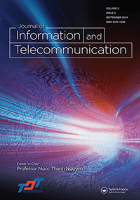
Journal of Information and Telecommunication
Pioneering Research in the Heart of Digital Communication.Journal of Information and Telecommunication, published by TAYLOR & FRANCIS LTD, is a distinguished open access journal that has been enhancing the global discourse since its establishment in 2017. With an ISSN of 2475-1839 and an E-ISSN of 2475-1847, this journal is located in the United Kingdom and dedicates its focus to the fields of information technology, telecommunications, and related disciplines. Boasting a respectable Q2 quartile ranking across various categories including Computer Networks and Communications, Electrical and Electronic Engineering, and Computer Science Applications in 2023, it ranks notably in the top percentiles of scopus rankings, asserting its significance in the academic community. The journal's commitment to open access since its inception has fostered widespread accessibility, encouraging research dissemination and collaboration on a global scale. By providing a platform for high-quality research, it aims to unite researchers, professionals, and students in their pursuit of innovation and excellence in the ever-evolving digital landscape.
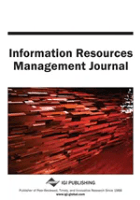
Information Resources Management Journal
Illuminating Pathways in Information Resource Management.Information Resources Management Journal, published by IGI Global, is a pivotal academic resource dedicated to the exploration of innovations and best practices in the realms of information management, library sciences, and strategic management. First established in 1988, this journal has continually evolved, providing researchers and practitioners with essential insights that shape the industry. With an impressive Scopus ranking positioning it within the 75th percentile in Library and Information Sciences, and its notable presence in Business and International Management, it garners attention from a diverse audience keen on navigating the complexities of managing information resources effectively. Although it currently does not offer open access options, the journal remains committed to disseminating impactful research that resonates with scholars and industry professionals alike. As it approaches its convergence year of 2024, Information Resources Management Journal stands as a cornerstone for those aspiring to contribute meaningfully to the ever-evolving landscape of information management.
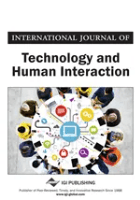
International Journal of Technology and Human Interaction
Bridging the Gap Between Technology and Human BehaviorInternational Journal of Technology and Human Interaction, published by IGI Global, serves as a critical platform for the exploration of the intersection between technology and human behavior, offering an interdisciplinary lens on topics within the realms of Human-Computer Interaction and Information Systems. With an ISSN of 1548-3908 and an E-ISSN of 1548-3916, this journal has been contributing to scholarly discourse since its inception in 2005, with ongoing publication until 2024. Hosting a diverse range of research articles, case studies, and reviews, the journal aims to advance the understanding of how technology influences human experience and interaction patterns in various contexts. Although currently positioned in the Q4 quartile of both Human-Computer Interaction and Information Systems categories, the journal fosters knowledge that aspires to redefine scope and standards within the field. Its commitment to quality research is reflected in its Scopus rankings, showcasing its relevance despite its emerging status in academia. Targeting researchers, professionals, and students alike, the International Journal of Technology and Human Interaction invites contributions that address the pressing challenges and innovations at the nexus of technology and human interaction.
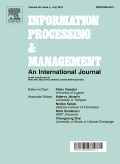
INFORMATION PROCESSING & MANAGEMENT
Advancing Knowledge in Information ManagementINFORMATION PROCESSING & MANAGEMENT, published by ELSEVIER SCI LTD, is a distinguished journal at the forefront of research in the fields of Computer Science, Information Systems, Library and Information Sciences, and Management Science and Operations Research. Since its inception in 1975, this journal has continually evolved to provide a scholarly platform for the dissemination of innovative methodologies and frameworks in information processing. With a remarkable Q1 ranking across multiple disciplines and esteemed Scopus rankings—notably, 1st in Media Technology and 4th in Library and Information Sciences—it stands as a pivotal resource for researchers, professionals, and students alike, seeking to advance their understanding and application of information management principles. Although not an Open Access journal, it remains widely accessed and respected, marking its influence in shaping the future of effective information management practices. The journal is committed to providing a rigorous peer-review process, ensuring the publication of high-quality research that addresses current challenges and trends in information technology and its application in various sectors.
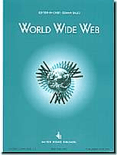
WORLD WIDE WEB-INTERNET AND WEB INFORMATION SYSTEMS
Connecting Ideas in Computer Networks and ArchitectureWORLD WIDE WEB - INTERNET AND WEB INFORMATION SYSTEMS, published by Springer, is a leading academic journal that focuses on the cutting-edge areas of Internet technologies and web-based information systems. With an esteemed ISSN of 1386-145X and an E-ISSN of 1573-1413, this journal has been a significant contributor to the fields of Computer Networks and Communications, Hardware and Architecture, and Software since its inception in 1998. The journal consistently ranks in the Q1 category across these fields, reflecting its high impact and relevance, evidenced by its impressive Scopus rankings where it stands in the upper percentiles (79th for Computer Networks and Communications, 77th for Hardware and Architecture, and 75th for Software). Researchers, professionals, and students looking to stay at the forefront of web information systems will find a wealth of valuable resources and innovative research compellingly presented in this journal, available for publication until 2024.
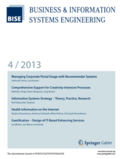
Business & Information Systems Engineering
Pioneering Insights in Business and Information Systems EngineeringBusiness & Information Systems Engineering is a premier journal dedicated to the intersection of business and information systems, published by SPRINGER VIEWEG-SPRINGER FACHMEDIEN WIESBADEN GMBH in Germany. With an impressive 2023 impact factor placing it in the Q1 category in Information Systems, this journal stands out for its rigorous peer-reviewed research that addresses the dynamic challenges faced by businesses in the digital age. Spanning from 2009 to 2024, it showcases empirical studies, theoretical frameworks, and practical applications, ensuring relevance for both researchers and practitioners alike. As part of the Scopus rankings, it is recognized within the top 93rd percentile in the field of Computer Science, specifically Information Systems, ranking #26 out of 394 journals. Currently, the journal operates under a non-open access model, thus providing a platform for high-quality research while maintaining exclusivity. Engaging with this journal is essential for anyone looking to stay at the forefront of developments in business and technology integration.

BEHAVIOUR & INFORMATION TECHNOLOGY
Pioneering Research at the Crossroads of Behavior and Tech.BEHAVIOUR & INFORMATION TECHNOLOGY, published by Taylor & Francis Ltd, is a leading journal in the interdisciplinary field that bridges the gap between technology and human behavior. Established in 1982 and continuing through 2024, this journal has garnered a high reputation with impressive rankings in 2023 across various categories: Q1 in Arts and Humanities (miscellaneous), Q2 in Developmental and Educational Psychology, Q2 in Human-Computer Interaction, and Q1 in Social Sciences (miscellaneous). The journal's robust Scopus rankings point to its influence among peers, being placed in the top percentiles across multiple relevant disciplines. Although it does not offer open access, it remains a pivotal resource for researchers and practitioners interested in the dynamics of technology's impact on behavior. By publishing rigorously peer-reviewed research, BEHAVIOUR & INFORMATION TECHNOLOGY aims to foster insights that enhance our understanding of how information technology shapes human interactions and societal outcomes, making it a crucial publication for anyone engaged in this rapidly evolving field.

International Journal of Information Systems and Supply Chain Management
Innovating Solutions for Tomorrow's Supply Chain ChallengesThe International Journal of Information Systems and Supply Chain Management (ISSN: 1935-5726, E-ISSN: 1935-5734), published by IGI GLOBAL, serves as a crucial platform for disseminating research in the intersecting fields of information systems and supply chain management. Established in 2008 and continuing through 2024, this journal addresses the emerging trends, challenges, and innovations within these domains, making valuable contributions to both academic and practical applications. Though currently indexed in the Q4 Quartile in the realms of Information Systems and Management Information Systems, the journal seeks to elevate its stature through high-quality peer-reviewed articles that explore the intricacies of digital transformation, data analytics, and the optimization of supply chains. Researchers, professionals, and students alike will find in this journal a wealth of knowledge and a conduit for collaborative exploration in understanding the dynamic relationships driving modern business environments. Access to comprehensive research articles aids in fostering a deeper understanding of the vital roles that information systems play within supply chains globally.
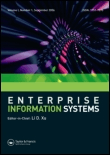
Enterprise Information Systems
Navigating the Evolving World of Information Systems.Enterprise Information Systems, published by Taylor & Francis Ltd, is a prestigious academic journal dedicated to the dynamic field of information systems, emphasizing the intersection of technology and business processes. With a notable impact factor reflecting its significance in the scholarly community, the journal ranks in the Q2 category for Computer Science Applications and Q1 for Information Systems and Management as of 2023. Covering a broad scope from theoretical foundations to practical implementations, this journal serves as a crucial platform for disseminating cutting-edge research that enhances understanding of enterprise systems and their effective integration within organizations. Researchers, professionals, and students will find valuable insights in its pages, with contributions that shape the future of enterprise information systems. Established in 2007 and continuing through 2024, Enterprise Information Systems is essential for anyone looking to stay at the forefront of trends and advancements in this evolving field.

Human-centric Computing and Information Sciences
Exploring the Nexus of Human Interaction and ComputingHuman-centric Computing and Information Sciences, published by the Korea Information Processing Society, represents a leading platform in the field of computer science, particularly focusing on the interaction between humans and computational systems. With an impressive Q1 ranking in the 2023 category of Computer Science (miscellaneous) and a commendable Scopus rank of #14/232 (94th percentile), this journal has established itself as a cornerstone for researchers and practitioners dedicated to advancing understanding in this vital area. Understanding the significance of making technology more accessible and effective for users, the journal has been an Open Access publication since 2011, promoting wide dissemination of knowledge without barriers. The journal's scope encompasses innovative methodologies, user experience design, and the integration of human factors into computing environments, making it essential reading for anyone interested in the intersection of technology and society. With all articles freely accessible, the journal not only contributes to scholarly discourse but also encourages collaboration among researchers worldwide, fostering further advancements in human-centric computing.